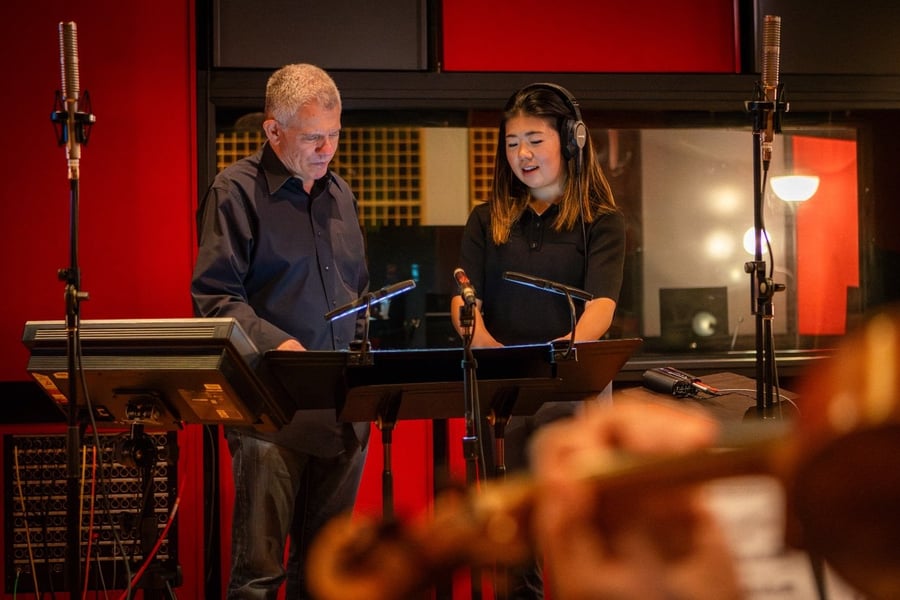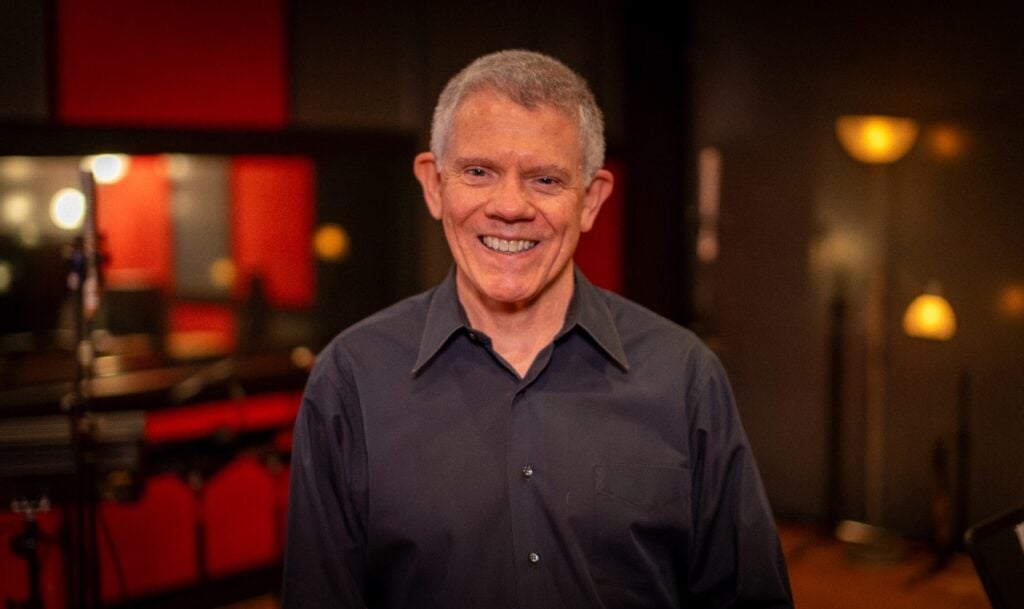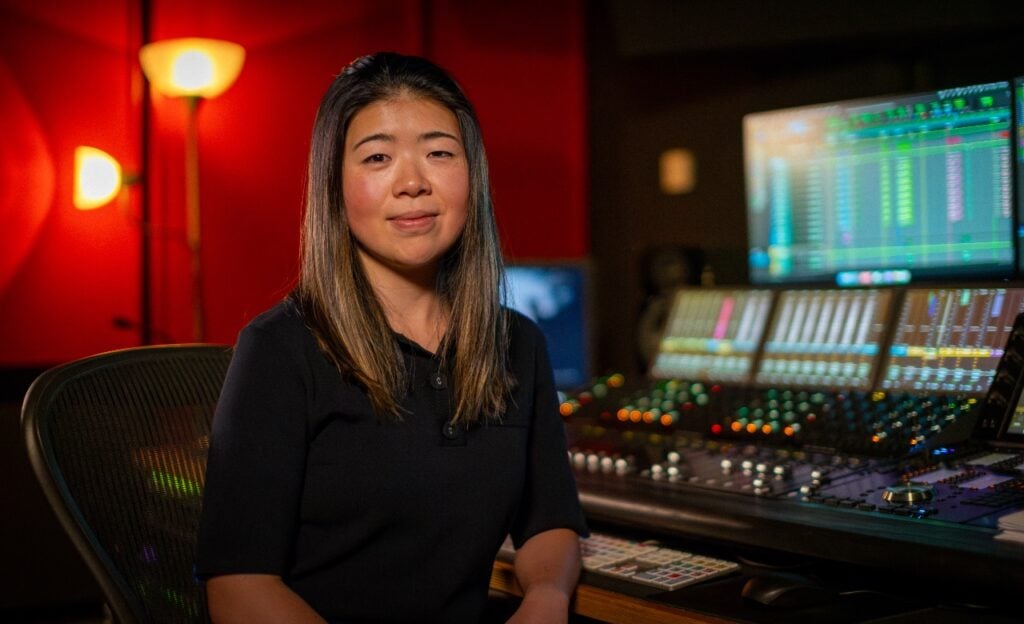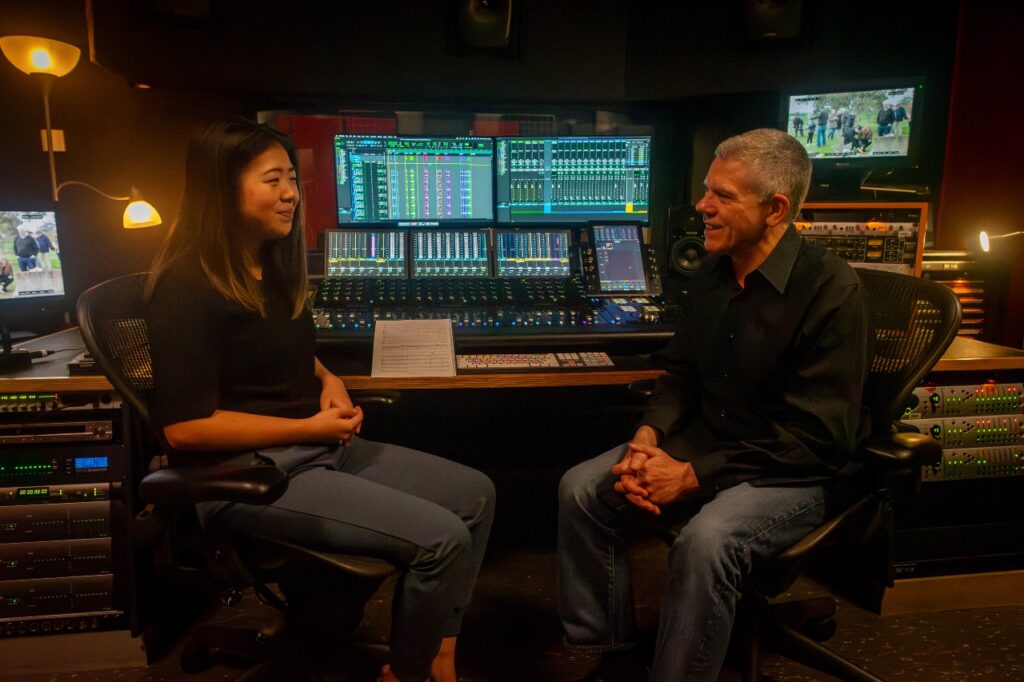If you have a musical background and are interested in screen music composition, the Australian Film Television and Radio School (AFTRS) Master of Arts Screen: Music course could be the catalyst to take you there.
The course teaches students how to develop their compositional voice and hone their creative and technical skills as screen music practitioners. Students can emerge in the industry as screen composers, orchestrators, copyists, music editors, and programmers in film, television, documentary, advertising, web-based, and interactive projects.
“The MAS: Music course is divided into three broad strands: Music & Narrative, Composing for the Screen and The Business of Screen Music,” explains AFTRS Discipline Lead, Cameron Patrick, himself an Annie Award nominee and AGSC Screen Music Award winner whose screen experience spans 30 years, with credits including Spider-Man: Homecoming (2017), Zootopia (2016), Jurassic World (2015), and Inside Out (2015) among many others.
“It’s important to note that this is not a music theory or music composition degree,” Cameron explains. “You’re already expected to have that knowledge and training. The difference is we take those skills you already have and train you to use them to compose compelling music for screen stories.
Cameron emphasises that applicants to the MAS: Music should demonstrate a deep understanding of musical storytelling and hold a relevant Bachelor’s degree – ideally in Composition, Instrumental Performance, or Music for Creative Industries – or to qualify for Degree Equivalence have completed a similar volume of relevant work experience and/or training out in the screen composition industry.
High qualifications from the Australian Music Examinations Board’s Theory of Music, Musicianship, Music Craft, or Instrumental Performance would also be taken into consideration when combined with a Bachelor’s degree or Degree Equivalence. Applicants are also required to have a working knowledge of a Digital Audio Workstation (DAW) and professional-level music notation software programs.
“There’s no sugar coating that the realities of breaking into the business after graduation can be a challenge. Getting your work in front of the people who make the hiring decisions is the key of course, and that’s where your networks really come into play… along with patience and tenacity! There are a number of well-trodden paths AFTRS grads can follow upon leaving the school which provide effective stepping stones into a career as working screen composers.”
Love Music?
Get your daily dose of everything happening in Australian/New Zealand music and globally.
Soundtrack to a Career Change
MAS Music graduate Genevieve Patrick had long lived a musical life with a love of soundtracks in feature films. She learnt piano at four then violin at 11, played in her high school orchestra and then went on to study a Bachelor of Music in piano alongside a law degree. The latter pursuit won out and she worked as a corporate lawyer for several years before the call of music once again became too strong.
“I worked at a lovely law firm in South Yarra and enjoyed many aspects of it, namely the intellectual challenge, the structure and the clients,” Genevieve says. “But over time I found the black letter nature of legal practice, while valuable, wasn’t a passion or strength, or something I wanted to pursue endlessly. Looking back, it was clear where my passion lay – it just took me a while to organise myself and recognise screen scoring as a possible career.
“I researched screen music programs in Australia and learned of AFTRS. What stood out were the strong films it produced, connections to industry, the emphasis on working with session musicians in an industry-aligned recording environment, and collaborating on real films with directors, writers, producers, and other creatives.”
As she learnt how to adapt her existing orchestration skills for screen, Genevieve discovered and felt embraced by a supportive and creative environment, led by staff with decades of playing, composing, and recording experience, world-class purpose-built facilities, and a “weapons grade” music department.
“There were many discoveries,” she notes. “I acquired firsthand experience of the entire filmmaking process from development to post-production and learnt where the composer fits into that journey. I quickly learnt that screen music is more than just writing your own music – it must serve the picture, the storyworld, the director’s vision, the dialogue, and work within tight creative and practical constraints.
“In addition to technical craft, I discovered that the focus on Creative Practice Research and Screen Studies in situating our practice in broader cultural and screen media contexts deeply enriched my craft and my understanding of my own creative practice. Consistent highlights were copious opportunities to compose for real films, recording sessions, being on film sets, and making lovely friends and collaborators who I hope to work with well into the future.”
Genevieve’s work has featured in recent films such as Dirty Laundry (which was selected for the 2025 Flickerfest Festival), Bringing His Spirit Home, and Interview with a Hero (both premiering at this year’s Sydney Film Festival).
“I loved scoring these films, each with a different crew of collaborators,” she says. “Bringing His Spirit Home is a gorgeous doco full of reverence and hope, so we recorded a chamber string ensemble and blended this with sampled brass and light synth textures. For the enigmatic Interview with a Hero, we crafted an intimate hybrid score of strings, piano, and synths. Dirty Laundry is a political satire, so we recorded a string quintet and added sampled percussion and choir to bring out the humour and drama.
“We made those films at the latter end of the course, so by the time we worked on them, through coursework I’d completed around a dozen scoring projects and half a dozen recording sessions, and I felt equipped to collaborate with a director to realise their vision and write with whatever palette the picture called for.”
AFTRS’ Point of Difference
While there are quite a few screen composition programs at the undergraduate and graduate level in both Europe and the USA, AFTRS is the only screen composition graduate course offering in Australia.
“Except for a small handful of film schools like AFTRS, most of the aforementioned programs are part of conservatoria or university music departments,” Cameron says. “For AFTRS Music students, being part of a film school where all of the filmmaking disciplines are under the same roof, allows our students to live and breathe filmmaking craft… whether in joint classes and collaborative practice projects together, whether in line with friends getting a coffee at our wonderful cafe, even down at the pub in the Entertainment Quarter.
“A huge part of their learning is figuring out how to effectively communicate in story terms, how to collaborate respectfully and how to make compromises to make a final product as good as it can possibly be for the whole team. Being able to build friendships across all of the disciplines, with the people who are going out there to actually make the films, over two years of the MAS really sets us apart on that score, excuse the pun.
“If you have a real love for screen scoring and the incredible legacy of wonderful scores that populate your favourite films, coupled with a burning desire to immerse yourself in learning how it is done, then don’t hesitate. Jump right in and put together an application.”
With a thriller/horror short film in the works and a few projects in the pipeline, including a feature length project shot on film by a friend who completed the cinematography stream of the Master’s program, Genevieve wholeheartedly concurs.
“I’d say go for it but come prepared,” she notes, “Proficiency in reading and writing music is essential for the coursework and responding effectively to creative briefs. The program is intense but deeply rewarding and lots of fun. Finally, immerse yourself in cinema and watch lots of movies!”
Breaking Down the Master of Arts Screen: Music
Music & Narrative: under this umbrella, the course explores structure and form in drama and why music is put to screen stories. It’s a broad overview of the craft and its history.
Composing for the Screen – or how to put music to screen stories – is comprised of two parts: Screen Composition Theory, which covers composing to picture, developing your screen composer’s toolbox, collaborative practice, the challenges and requirements of working across multiple genres of screen content, electronic music, acoustic instrumentation, and orchestration, recording session supervision, and studio conducting; and Screen Composition Technology, which covers Digital Audio Workstation (DAW) principles, an introduction and up-skilling in Pro Tools (the only DAW we teach), recording, editing, and mixing basics, digital sampling, and sample libraries.
The Business of Screen Music: this second-year strand prepares students to launch into the industry with an understanding of the legalities associated with screen scoring, such as how music copyright, royalties, and contracts work, as well as how to market and brand yourself and how to survive the rollercoaster of being a freelance composer.
The other Masters subjects are Screen Studies (critical analysis and investigation of the history and theory of moving image media) and Research & Development, which runs through the entire two years, preparing students for their creative practice research project due at the end of the Year 2. Both subjects are shared with the broader AFTRS filmmaking cohort.
Applications are now open for the 2026 intake for Master of Arts Screen: Music. Head to aftrs.edu.au for more details.






































